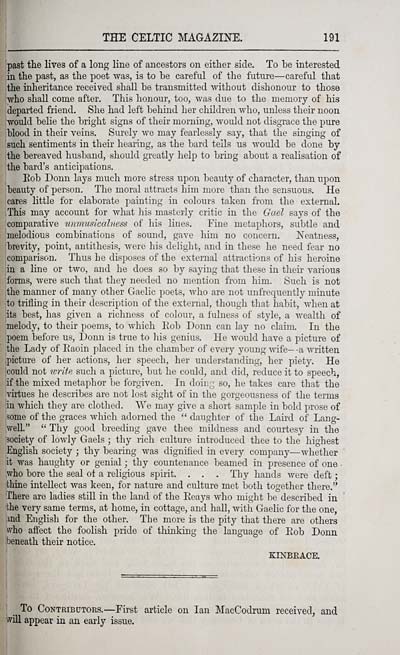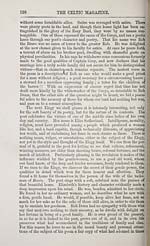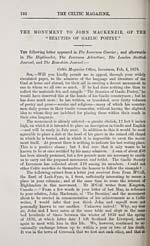Blair Collection > Celtic magazine > Volume 3
(201)
Download files
Complete book:
Individual page:
Thumbnail gallery: Grid view | List view

THE CELTIC MAGAZINE. 191
past the lives of a long line of ancestors on either side. To be interested
in the past, as the poet was, is to be careful of the future — careful that
the inheritance received shall be transmitted without dishonour to those
■who shall come after. This honour, too, was due to the memory of his
departed friend. She had left behind her chUdren who, unless their noon
would belie the bright signs of their morning, would not disgTace the pure
blood in their veins. Siu-ely we may fearlessly say, that the singing of
such sentiments in their hearing, as the bard teUs us would be done by
the bereaved husband, should greatly help to briug about a realisation of
the bard's anticipations.
Eob Donn lays much more stress upon beauty of character, than upon
beauty of person. The moral attracts him more than the sensuous. He
cares little for elaborate painting in colours taken from the external.
This may account for what liis masterly critic in the Gael says of the
comparative unmusicalness of his lines. Fine metaphors, subtle and
melodious combinations of sound, gave him no concern. Neatness,
brevity, point, antithesis, were his delight, and in these he need fear no
comparison. Thus he disposes of the external attractions of his heroine
in a line or two, and he does so by saying that these in theii- various
forms, were such tlrat they needed no mention from him. Such is not
the manner of many other Gaelic poets, who are not unfrequently minute
to trifling in their description of the external, though that habit, when at
its best, has given a richness of colour, a fulness of style, a wealth of
melody, to their poems, to which Eob Donn can lay no claim. In the
poem before us, Donn is true to his genius. He would have a picture of
the Lady of Eaoin placed in the chamber of every young wife- -a written
picture of her actions, her speech, her understanding, her piety. He
could not write such a picture, but he could, and did, reduce it to speech,
if the mixed metaphor be forgiven. In Aoiw^ so, he takes care that the
virtues he describes are not lost sight of in the gorgeousness of the terms
in which they are clothed. We may give a short sample in bold prose of
some of the graces which adorned the " daughter of the Laird of Lancf-
AveU." " Thy good breeding gave thee mildness and courtesy in the
society of lowly Gaels ; thy rich culture introduced thee to the highest
English society ; thy bearmg was dignified in every company — whether
it was haughty or genial ; thy countenance beamed in presence of one
who bore the seal ot a religious spirit. . . . Thy hands were deft ;
thine intellect was keen, for nature and culture met both together there."
There are ladies still in the land of the Eeays who might be described in
■the very same terms, at home, in cottage, and hall, with Gaelic for the one,
md English for the other. The more is the pity that there are others
who affect the foolish pride of thinking the language of Eob Donn
beneath their notice.
KINBKACE.
To Contributors. — First article on Ian MacCodrum received, and
ivill appear in an early issue.
past the lives of a long line of ancestors on either side. To be interested
in the past, as the poet was, is to be careful of the future — careful that
the inheritance received shall be transmitted without dishonour to those
■who shall come after. This honour, too, was due to the memory of his
departed friend. She had left behind her chUdren who, unless their noon
would belie the bright signs of their morning, would not disgTace the pure
blood in their veins. Siu-ely we may fearlessly say, that the singing of
such sentiments in their hearing, as the bard teUs us would be done by
the bereaved husband, should greatly help to briug about a realisation of
the bard's anticipations.
Eob Donn lays much more stress upon beauty of character, than upon
beauty of person. The moral attracts him more than the sensuous. He
cares little for elaborate painting in colours taken from the external.
This may account for what liis masterly critic in the Gael says of the
comparative unmusicalness of his lines. Fine metaphors, subtle and
melodious combinations of sound, gave him no concern. Neatness,
brevity, point, antithesis, were his delight, and in these he need fear no
comparison. Thus he disposes of the external attractions of his heroine
in a line or two, and he does so by saying that these in theii- various
forms, were such tlrat they needed no mention from him. Such is not
the manner of many other Gaelic poets, who are not unfrequently minute
to trifling in their description of the external, though that habit, when at
its best, has given a richness of colour, a fulness of style, a wealth of
melody, to their poems, to which Eob Donn can lay no claim. In the
poem before us, Donn is true to his genius. He would have a picture of
the Lady of Eaoin placed in the chamber of every young wife- -a written
picture of her actions, her speech, her understanding, her piety. He
could not write such a picture, but he could, and did, reduce it to speech,
if the mixed metaphor be forgiven. In Aoiw^ so, he takes care that the
virtues he describes are not lost sight of in the gorgeousness of the terms
in which they are clothed. We may give a short sample in bold prose of
some of the graces which adorned the " daughter of the Laird of Lancf-
AveU." " Thy good breeding gave thee mildness and courtesy in the
society of lowly Gaels ; thy rich culture introduced thee to the highest
English society ; thy bearmg was dignified in every company — whether
it was haughty or genial ; thy countenance beamed in presence of one
who bore the seal ot a religious spirit. . . . Thy hands were deft ;
thine intellect was keen, for nature and culture met both together there."
There are ladies still in the land of the Eeays who might be described in
■the very same terms, at home, in cottage, and hall, with Gaelic for the one,
md English for the other. The more is the pity that there are others
who affect the foolish pride of thinking the language of Eob Donn
beneath their notice.
KINBKACE.
To Contributors. — First article on Ian MacCodrum received, and
ivill appear in an early issue.
Set display mode to: Large image | Transcription
Images and transcriptions on this page, including medium image downloads, may be used under the Creative Commons Attribution 4.0 International Licence unless otherwise stated. ![]()
| Early Gaelic Book Collections > Blair Collection > Celtic magazine > Volume 3 > (201) |
|---|
| Permanent URL | https://digital.nls.uk/76445802 |
|---|
| Description | Volume III, 1878. |
|---|---|
| Shelfmark | Blair.4 |
| Attribution and copyright: |
|
| Description | A selection of books from a collection of more than 500 titles, mostly on religious and literary topics. Also includes some material dealing with other Celtic languages and societies. Collection created towards the end of the 19th century by Lady Evelyn Stewart Murray. |
|---|
| Description | Selected items from five 'Special and Named Printed Collections'. Includes books in Gaelic and other Celtic languages, works about the Gaels, their languages, literature, culture and history. |
|---|

